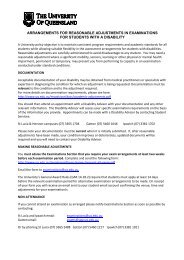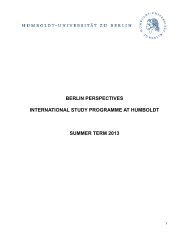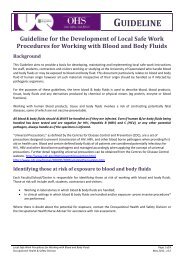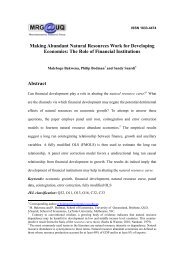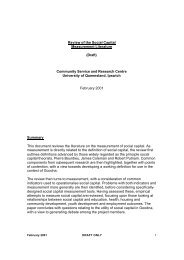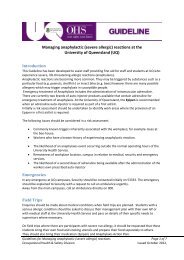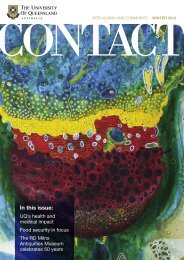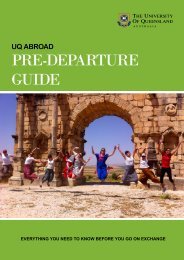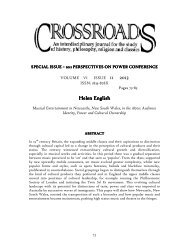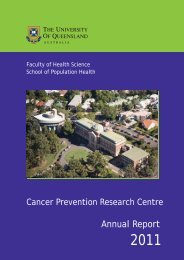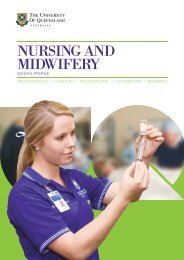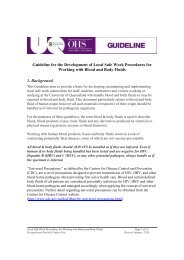Download PDF - University of Queensland
Download PDF - University of Queensland
Download PDF - University of Queensland
- No tags were found...
You also want an ePaper? Increase the reach of your titles
YUMPU automatically turns print PDFs into web optimized ePapers that Google loves.
Undergraduate programPostgraduate coursework programResearch higher degreesarchitecture2013
WHYSHOULD ICHOOSEUQ?Because we <strong>of</strong>fer excellent teaching, in a world-class environment,with exceptional opportunities for an experience you will always remember.THE UQ ADVANTAGEChoice <strong>of</strong> programsUQ has the most comprehensive range<strong>of</strong> high-quality programs in <strong>Queensland</strong>,with 350+ programs and more than 4000courses <strong>of</strong>fered at undergraduate andpostgraduate levels. You can also undertakean undergraduate (concurrent) diplomain languages, global issues or musicperformance at the same time as you arecompleting your bachelor degree.ExcellentteachersUQ has won more national teaching awardsthan any other university in the country.The <strong>University</strong> has more than 2700 highlyqualifiedacademic staff dedicated toteaching and research, many <strong>of</strong> whom arerecognised internationally as leaders intheir fields.SuccessfulgraduatesUQ has a tradition <strong>of</strong> leadership in allspheres <strong>of</strong> society, both here and overseas:we include a Nobel Laureate, an Oscarwinner, two Governors-General, severalgovernors, scores <strong>of</strong> politicians and Olympicathletes, and countless businesspeople,researchers, and inventors among ourgraduates.Leading researchWith eight research institutes on-site,UQ is one <strong>of</strong> the country’s top three researchuniversities across many measures, includingannual PhD graduations, commercialisation<strong>of</strong> discoveries, industry collaboration,Excellence in Research for Australia surveyresults, and funds received from bothgovernment and the private sector.
InternationalreputationUQ is in the top 100 universities worldwide,as measured through a combination <strong>of</strong>three key global university rankings – TimesHigher Education, Shanghai Jiao Tong, andQS World <strong>University</strong>. UQ is also one <strong>of</strong> onlythree Australian members <strong>of</strong> Universitas 21, aselect international network <strong>of</strong> comprehensive,research-intensive universities.Great careersUQ qualifications are highly regarded byAustralian and international employers, andthe employment rate and starting salary forUQ graduates is considerably higher than thenational average. The multitude <strong>of</strong> programsreflects the diversity <strong>of</strong> career opportunitiesavailable to graduates, and the industry linksensure success.Top facilitiesUQ is constantly upgrading its teachingfacilities to meet the needs <strong>of</strong> both studentsand industry. We have an active buildingprogram, one <strong>of</strong> the world’s fastestinformation networks, one <strong>of</strong> the country’sbest research libraries, and modern teachingspaces that enable the use <strong>of</strong> the latesttechnology.Campus lifestyleYou will enjoy the sense <strong>of</strong> community thatpervades UQ’s cosmopolitan campuses atSt Lucia, Ipswich, Gatton and Herston. Thecampuses are renowned as being among themost beautiful and well-equipped in Australia,and <strong>of</strong>fer excellent sporting and culturalfacilities plus a broad range <strong>of</strong>social activities.ContentsWhy choose UQ Architecture? 3Terminology explained 4Architecture program pathways 5ACADEMICPROGRAMSBachelor <strong>of</strong> Architectural Design 6The first year architecture experience 8Master <strong>of</strong> Architecture 10Research Higher Degree programs 12Facilities and resources 13Travel abroad design studio 14Overseas opportunities 15Admission information 16Scholarships and Prizes 17Money matters 18Summer Exhibition 19International students 20
2Architecture UQ Guide 2013If you want to make a positivecontribution to the shaping <strong>of</strong>our built environment and to ourculture, then architecture is for you.Pic tochange“UQ has excellentteaching staff,fantastic facilitiesand <strong>of</strong>fers greatcourses, which inturn allows me to bemore competent andcompetitive in theworkforce.”OUTSTANDINGFACILITIESOne <strong>of</strong> the few Universities to <strong>of</strong>fer dedicated studio facilities for students, UQ’sstudios are available for use 24 hours a day, 7 days a week. The creative designstudios are the principal learning space for UQ Architecture students and theheart <strong>of</strong> our pr<strong>of</strong>essional program. The studios are available to students at everylevel <strong>of</strong> the program, and are used for project work, tutorials, general study anddiscussion. UQ’s School <strong>of</strong> Architecture also boasts a range <strong>of</strong> other facilitiesincluding a Collaborative Design Laboratory, Computer Laboratory, Workshop,and the Architecture and Music Library which houses one <strong>of</strong> the most extensivecollections <strong>of</strong> architectural material in Australia.HIGHLY AWARDEDTEACHERSStudying architecture at UQ means that youwill benefit from and contribute to a tradition <strong>of</strong>excellence, meanwhile attaining a degree fromone <strong>of</strong> the leading schools in Australia. Ourstaff are not only <strong>of</strong> the highest calibre, butare also pr<strong>of</strong>essional architects who conductleading research. This ensures that coursecontent forms a strong foundation on which tobuild your career.architecture 2012
Architecture UQ Guide 20133WHYCHOOSE UQarchitecture?The UQ Architecture advantage:UNPARALLELEDOPPORTUNITIESUQ’s School <strong>of</strong> Architecture <strong>of</strong>fers courses thatmeet the changing demands <strong>of</strong> the pr<strong>of</strong>ession andmake a positive contribution to the shaping <strong>of</strong> ourbuilt environment and culture. Throughout yourdegree, you will have opportunities to get involvedin hands-on community-based projects, as well asoverseas study – providing you with an internationalarchitectural perspective. As a result <strong>of</strong> studyingarchitecture at UQ, you will be presented withoutstanding employment opportunities.QUALITYPROGRAMSThe <strong>University</strong> <strong>of</strong> <strong>Queensland</strong> is one <strong>of</strong>Australia’s leading institutions for architecturaleducation and research. Offering apr<strong>of</strong>essionally accredited program, architecturaleducation at UQ consists <strong>of</strong> a two-tier programmade up <strong>of</strong> a three-year undergraduatedegree (Bachelor <strong>of</strong> Architectural Design)and a two-year postgraduate courseworkdegree (Master <strong>of</strong> Architecture). To ensureinvaluable insight into the pr<strong>of</strong>ession, tenmonths work experience is required to enrol inthe Masters degree. The structure is alignedwith international benchmarks in architecturaleducation and incorporates the requirementsfor pr<strong>of</strong>essional registration as an architect.The two-tier program <strong>of</strong>fers students theopportunity for comprehensive study inarchitectural design and research.
4Architecture UQ Guide 2013TErminologyexplainedAustralian (domestic) studentA student who is an Australian citizen orpermanent resident, or a New Zealand citizen.Bachelor degreeA qualification awarded for the first level <strong>of</strong>study undertaken at university, generallyrequiring three to five years <strong>of</strong> study, dependingon the bachelor degree studied.Course (formerly known as subject)A component <strong>of</strong> study within a program, similarto a subject at school. Full-time studentsusually study four courses per semester.Dual programA combination <strong>of</strong> two UQ degree programsundertaken at the same time. These aresometimes called dual degrees, paralleldegrees, combined degrees, or double degrees.ElectiveA course that you can choose to study froma set <strong>of</strong> options. Some UQ programs allowelectives from outside your main area <strong>of</strong> study.Entry scoresUndergraduate students are given an entryscore based on high school studies or otherpost-secondary studies. If you complete highschool studies in <strong>Queensland</strong> you are assignedan Overall Position (OP). Year 12 students inother Australian states are assigned an InterstateTransfer Index (ITI). All other students areassigned a rank. Once you have completed a fullyear <strong>of</strong> study at UQ, your OP or ITI is convertedto a rank based on Grade Point Average (GPA).Grade point average (GPA)The average grade <strong>of</strong> your results, weightedby the unit value <strong>of</strong> each course. GPA isdetermined on a semester basis and rangesfrom 1 (lowest) to 7 (highest).FacultyA major organisational unit within UQ, withresponsibility for academic programs, e.g.,Faculty <strong>of</strong> Arts. Faculties may have a number<strong>of</strong> sub-faculty academic units called Schools,e.g., School <strong>of</strong> ... The head <strong>of</strong> a faculty iscalled an Executive Dean.HonoursStudents planning to go on to researchprograms (e.g. Master <strong>of</strong> Philosophy, PhD),are usually required to complete a bachelorprogram with honours. To qualify for honours,students must achieve high enough results intheir bachelor degree. In most cases, honoursis available as an additional year <strong>of</strong> study.International studentA student who is not an Australian citizen orpermanent resident, nor a New Zealand citizen,and is enrolled or proposes to enrol at an institutionin Australia. Temporary residents <strong>of</strong> Australia arealso classified as international students.Major/Extended/Dual MajorA major or extended major is an area <strong>of</strong>specialised study within a program, for example,chemistry. A major, extended major, or dual majormay be a formal requirement in a program.MinorA small group <strong>of</strong> courses in a discipline. A minoris worth approximately half the value <strong>of</strong> a major.Overall Position (OP)Overall Positions, or OPs, provide a State-widerank order <strong>of</strong> students (on a 1 to 25 scale, 1being the highest) based on your achievementin Authority subjects studied for the<strong>Queensland</strong> Senior Certificate. Your OP showshow well you have performed in your seniorstudies when compared with the performances<strong>of</strong> all other OP-eligible students in <strong>Queensland</strong>.Postgraduate programsPrograms studied after graduating fromundergraduate degrees which include graduatecertificates, graduate diplomas, masters, anddoctorates.Program (formerly known as course)A sequence <strong>of</strong> study involving enrolment,study and graduation, normally awarded witha qualification such as a bachelors degree,graduate diploma, or certificate.Program codeA unique identifying number assigned by the<strong>University</strong> to a program.QTACThe <strong>Queensland</strong> Tertiary Admissions Centre(QTAC), the central admissions body for all<strong>Queensland</strong> undergraduate programs.SemesterThe <strong>University</strong> teaching year is divided intothree semesters: Semester 1, Semester 2, andSummer Semester. Most programs only requireenrolment in Semesters 1 and 2 each year.Study AbroadA program where students enrolled at anoverseas university study at UQ for one ortwo semesters as part <strong>of</strong> their home universitydegrees.Undergraduate programsUsually refers to first-time university programsincluding diplomas and bachelors degrees.UnitThe value <strong>of</strong> a course (#). Most courses at UQare worth two units but some are higher.UQ Terminologywww.uq.edu.au/study (see UQ Toolkit)Model and drawings <strong>of</strong> amplify: encampment project by Owen Murphy, Bachelor <strong>of</strong> Architectural Design 1st year 2011.
Architecture UQ Guide 20135program pathwaysBachelor <strong>of</strong>ArchitecturalDesign1st year2nd year3rd yearRESEARCHBachelor <strong>of</strong>Architectural DesignBArchDesBachelor <strong>of</strong>Architectural Design(Hons)BArchDes(Hons)10 months <strong>of</strong>pr<strong>of</strong>essional experienceCompletion <strong>of</strong> the Bachelor <strong>of</strong> ArchitecturalDesign (GPA 4.0) plus 10 monthspr<strong>of</strong>essional experience allows entry to theMaster <strong>of</strong> ArchitectureMaster <strong>of</strong>Architecture1st year2nd yearMaster <strong>of</strong> ArchitectureMArchPr<strong>of</strong>essional experienceMaster <strong>of</strong> Philosophy(by thesis or design)MPhilDoctor <strong>of</strong> PhilosophyPhDArchitectural PracticeExamination StateRegistration
6Architecture UQ Guide 2013Architectural DesignBachelor <strong>of</strong>Architectural DesignDuration3 years full-timeLocationSt LuciaDelivery mode InternalPrerequisiteQld Yr 12 or equivalent;English2012 entry scoreOP4*/Rank 95*, ATAR 94.8*,GPA 4.5QTAC code 71120HonoursAvailable as an additionalyear <strong>of</strong> studyFull-time workload 40 hr/weekComments Semester 1 start only*not all applicants on this OP were <strong>of</strong>fered a placeDesign studiothinkingWhat is architectural design?Architectural design is the core focus <strong>of</strong>architecture, a dynamic and exciting pr<strong>of</strong>essionthat makes a positive contribution to theshaping <strong>of</strong> the built environment and ourculture. Design is an essential component <strong>of</strong> thepractice <strong>of</strong> architecture. It requires a synthesis<strong>of</strong> ideas responding to needs <strong>of</strong> the client andthe community and an inherent concern for thequality <strong>of</strong> living and working environments.Practical experienceThe focus <strong>of</strong> the Bachelor <strong>of</strong> ArchitecturalDesign is the design studio. Here projectsare developed through the application andintegration <strong>of</strong> the knowledge and skills acquiredfrom supporting courses. In addition to design,key areas <strong>of</strong> the program include environmentaldesign, architectural technology, computeraided design, history and theory, and peopleenvironment studies.Specific objectives are:– The development <strong>of</strong> an understanding <strong>of</strong>ways design ideas can be used to order thebuilt environment at all scales from broadstrategic thinking through to the detailedresolution <strong>of</strong> buildings.– The development <strong>of</strong> communication skillsthrough the presentation and discussion<strong>of</strong> architectural and environmental designoutcomes with peers, the pr<strong>of</strong>ession and thecommunity.– The development <strong>of</strong> a coherent set <strong>of</strong>architectural design values.Career outcomesGraduates have employment opportunities witharchitects and in allied design pr<strong>of</strong>essions, inprivate companies, government departments,statutory bodies, local authorities, commercialdevelopment companies or researchorganisations.Pr<strong>of</strong>essional membershipAustralian Institute <strong>of</strong> Architects—StudentMembershipInternational experienceThe UQ Abroad program provides anopportunity to study for one or two semestersoverseas and experience other cultures andapproaches to architectural design as well asimprove your language skills. See page 15 formore information.Entry to postgraduate studyThe Bachelor <strong>of</strong> Architectural Design(BArchDes) is a non-pr<strong>of</strong>essional degreerequiring the completion <strong>of</strong> three years <strong>of</strong>full-time study to be eligible to graduate.The BArchDes degree (GPA 4.0) is the basison which students can progress to thePr<strong>of</strong>essional Master <strong>of</strong> Architecture.
Architecture UQ Guide 20137Academic programsStudy PlanProgram Requirements:48 units from BArchDes program listYear 1Semester 1Code Course UnitsARCH1100 Architectural Design 1 4ARCH1110 Principles <strong>of</strong> Architecture 2ARCH1160 Architectural Communication 1 2Semester 2Code Course UnitsARCH1201 Architectural Design 2 4ARCH1220 Architectural Technology 1 2ARCH1230 Housing People & Place 2Year 2Semester 1Code Course UnitsARCH2100 Architectural Design 3 4ARCH2110Themes in the2History <strong>of</strong> Western ArchitectureARCH2120 Architectural Technology 2 2Semester 2Code Course UnitsARCH2200 Architectural Design 4 4ARCH2220 Architectural Technology 3 2Elective* 2Year 3Semester 1Code Course UnitsARCH3100 Architectural Design 5 4ARCH3120 Architectural Technology 4 2Elective* 2Semester 2Code Course UnitsARCH3200 Architectural Design 6 4ARCH3220 Architectural Technology 5 2Elective* 2*Electives:At least 2 units fromYears 1–3Code Course UnitsARCH2230 Architecture <strong>of</strong> the Region 2ARCH3110 Modern Architecture & the City 2ARCH3210 Culture, Environment & Design 2ARCH3300 Architecture in Asia 2And may include up to 4 units from the Bachelor <strong>of</strong> Arts list or other coursesapproved by the BArchDes Academic Advisor. Courses in Art History, Planning,Languages and Aboriginal and Torres Strait Islander Studies are recommended.BArchDes(Hons) programIf students do not wish to continue after completing the BArchDes theymay undertake a further year’s study (16 units) in the non-pr<strong>of</strong>essionalBArchDes(Hons) program.16 Units Comprising:8 units for –Code Course UnitsARCH4051 Honours Research Topic 1 2ARCH4052 Honours Research Topic 2 2ARCH4053 Honours Thesis 4At least 4 units from –Code Course UnitsARCH4151Advanced Topics in2Architectural History & TheoryARCH4152 Advanced Topics in Architectural Technology 2ARCH4251Advanced Topics in2People/Environment StudiesARCH6012 Research Topics 1 2And may include up to 4 units from –Code Course UnitsENVM2100 Sustainable Development 1 2ENVM3100 Sustainable Development 2 2GEOG3003 The Asian Metropolis 2PLAN2001 Planning Theory 2PLAN2003 Urban Design 2PLAN3002 Transport & Infrastructure Planning 2PLAN3005 Community Planning & Participation 2or advanced level courses from the Bachelor <strong>of</strong> Arts list or other coursesapproved by the BArchDes Honours Coordinator.Global Change institute project by Sarah Binns, Bachelor <strong>of</strong> Architectural Design 3rd year 2011
8Architecture UQ Guide 2013Architecture UQ Guide 2013 8The first yeararchitecture experienceAt UQ, your immersion inarchitectural study beginsin first year when youwill engage with issuesand develop the visualand broader thinking thatwill be relevant to yourpr<strong>of</strong>essional career.ArchitecturalDesignActivities <strong>of</strong> the architectural design studioencourage you to think ‘visually’; to synthesisecomplex and divergent project parameters; andto work cooperatively with others.You will work on ‘real’ community sitesincluding 1:1 scale design-build activitiesto explore the connection between ideas,materials and spaces.In 2012 commencing students wereintroduced to a number <strong>of</strong> design problemsand design techniques, which they were able todraw upon when designing their projects. Otherdesign-build projects included designing andmaking a paper ’body prosthetic’ specific to ahuman ‘body’ site; as well as a small, crafted sitespecificinstallation with accompanying sound file.At the end <strong>of</strong> each year, your projects will beshowcased at the annual Summer Exhibition(see page 19).See page 7 for a list <strong>of</strong> courses that youwill be studying as part <strong>of</strong> the Bachelor <strong>of</strong>Architectural Design.Taringa Scouts Project, installation by Sophie Briggs,Bachelor <strong>of</strong> Architectural Design 1st year, 2011.Photograph: Shuwei ZhangHeaddress design by 1st year BArchDes students, 20118architecture 2012
Architecture UQ Guide 20139“The Architectural Design courses in first yearencourage higher-order thinking, and help studentsdevelop the skills necessary for working with complexarchitectural problems in pr<strong>of</strong>essional practice.The centre <strong>of</strong> such experiences is a supportivedesign studio environment, a place that providesan important launching pad for the study <strong>of</strong>architecture and your future pr<strong>of</strong>essional career.”Cathy SmithFirst-year Architectural Design coordinator“My Bachelor <strong>of</strong> Architectural Design degree at UQhas been an unforgettable journey, shaped by overseastrips, networking with pr<strong>of</strong>essional architects andhands-on project work. I especially enjoyed the studioenvironment, which encourages open discussion withboth peers and tutors, providing an excellent foundationin which you get the most from the program. The stronglinks between the School <strong>of</strong> Architecture and many <strong>of</strong>Brisbane’s top architects ensured employment right aftermy graduation.”Jonathan BrownBachelor <strong>of</strong> Architectural Design andMaster <strong>of</strong> Architecture graduatearchitecture 20129
10Architecture UQ Guide 2013Master <strong>of</strong> architectureAcademic ProgramsMaster <strong>of</strong>ArchitectureDurationLocationDelivery modeEntry requirements2 years full time (or parttimeequivalent). Domesticstudents may undertakethe program on a part-timebasis.St LuciaInternalBachelor <strong>of</strong> ArchitecturalDesign (GPA 4.0) from UQ,or equivalent with portfoliosubmission; and at least10 months pr<strong>of</strong>essionalexperienceDeveloping theskills <strong>of</strong> thecreative designpr<strong>of</strong>essionalWhat is the Master <strong>of</strong> Architecture?The Master <strong>of</strong> Architecture is the second stage<strong>of</strong> pr<strong>of</strong>essional qualification in architecture. Youwill undertake a range <strong>of</strong> courses designed tohone your creative design skills and developadvanced technical and pr<strong>of</strong>essional skillsrelevant to the practice <strong>of</strong> architecture. TheMaster <strong>of</strong> Architecture program providesopportunities to research and apply the latestthinking in environmental design, architecturaltechnology, history and theory, people/environment studies and pr<strong>of</strong>essional practicewith challenging and engaging architecturaldesign studios as the central focus <strong>of</strong> theprogram.Practical experienceThe Master <strong>of</strong> Architecture, following theBachelor <strong>of</strong> Architectural Design, advancescreative thinking and practical learning throughimaginative and critical projects. Projectsintegrate and apply knowledge and skillsacquired from supporting courses. You willwork with leading academics and the state’smost creative architects to conceive newsolutions to major issues confronting thecontemporary city and its urban framework.The School <strong>of</strong> Architecture’s workshop andstudio facilities <strong>of</strong>fer the latest technology tosupport you in your project investigations. Thefundamental objective <strong>of</strong> the program is for youto develop the skills to become a pr<strong>of</strong>essionallyqualified graduate ready to contribute toarchitectural practice in its many forms.Specific objectives include:– Development <strong>of</strong> pr<strong>of</strong>essional competence inarchitectural design and practice; and– Contribution to architectural scholarshipthrough research, design and creativeworks.Career outcomesThe Master <strong>of</strong> Architecture is a requirement forregistration as an architect. Graduates mustundertake two years <strong>of</strong> practical experiencebefore they can legally practice as architects,at least one <strong>of</strong> which has to be subsequentto the award <strong>of</strong> the Master <strong>of</strong> Architecturedegree, and pass the Architectural PracticeExamination <strong>of</strong> the Board <strong>of</strong> Architects <strong>of</strong><strong>Queensland</strong>. Employment opportunities forgraduates include, but are not limited to,positions in architectural <strong>of</strong>fices, consultanciesrelated to the built environment and academicteaching or research positions.Pr<strong>of</strong>essional membershipAustralian Institute <strong>of</strong> Architects—GraduateMembershipInternational outlookArchitecture is a global activity requiring broadknowledge <strong>of</strong> international architecture. Manygraduates work alongside international architectsworking on projects in Australia or internationally.UQ <strong>of</strong>fers opportunities for internationalexperience. See page 15 for more information.FeesStudies for domestic students is at HECS-HELP rate.Study PlanProgram Requirements:32 units from MArch program listYear 1Code Course UnitsSemester 1ARCH7010 Architectural Design Studio 1 4ARCH7011 Advanced Architectural2Technology 1ARCH7012 Architectural Research 1 2Semester 2ARCH7020 Architectural Design Studio 2 4ARCH7021 Advanced Architectural2Technology 2ARCH7022 Architectural Research 2 2Year 2Semester 1ARCH7030 Architectural Design Studio 3 4ARCH7031 Architectural Practice 1 2ARCH7032 Architectural Research 3 2Semester 2ARCH7040 Architectural Design Studio 4 4ARCH7041 Architectural Practice 2 2ARCH7042 Research Project 2Note: 32 units Masters required forpr<strong>of</strong>essional accreditation.GCCC Civic Centre project by Jack Dodgson, Master <strong>of</strong> Architecture 2nd year, 2011
Architecture UQ Guide 201311Develop theoreticaland practical skills“My education at UQ taught me to think creatively and prepared me for a career inArchitecture. The projects I undertook during my education developed my interests inparametric design which I have applied in the workforce to resolve real architecturalproblems. Both the theoretical and practical education <strong>of</strong>fered at UQ have played animportant role in allowing me to develop as a designer and an architect. Between myBachelor and Masters Degree, I was fortunate enough to travel to a number <strong>of</strong> countries towitness their architectural styles first hand. Having the opportunity to witness architecturalwonders such as Machu Picchu have definitely influenced my architectural style.”jack dodgsonMaster <strong>of</strong> ArchitectureGraduate Architect, Cox Rayner Architects,Brisbane
Architecture UQ Guide 201313The <strong>University</strong> <strong>of</strong> <strong>Queensland</strong> <strong>of</strong>fersyou an extensive range <strong>of</strong> facilities andequipment to support your architecturalstudies.STUDIOSThe principal teaching space for architecturestudents is the design studio.The studios are available to students at eachlevel <strong>of</strong> the program as a home base and areused for project work, tutorials, general studyand discussion.All studios are equipped with drawingboards and storage, as well as high speedwireless broadband for students to accesswith their laptops. Architecture students haveaccess to the design studios 24 hours a day,seven days a week.LABORATORIES ANDWORKSHOPsCollaborative Design LaboratoryThe Collaborative Design Laboratory, a jointfacility for Architecture and Civil Engineeringstudents, provides facilities for constructionand the testing <strong>of</strong> building components andstructural elements as well as architectural andstructural models.Computer laboratoryThe computer teaching laboratory hascomputers connected to the <strong>University</strong>’sEthernet network and internet. S<strong>of</strong>twareresources include a range <strong>of</strong> Micros<strong>of</strong>t, Adobeand 3D CAD programs. Information TechnologyServices provides students with free emailaccounts and internet access.WorkshopThe model making and joinery workshop <strong>of</strong>fersthe latest technology allowing students tomake prototypes from model scale to full scale.The workshop is equipped with a full range<strong>of</strong> timber working equipment, a CNC flatbedrouter, and a laser cutter.UQ LIBRARYThe Architecture and Music Library (ARMUS),located on the third level <strong>of</strong> the Zelman CowenBuilding, is a branch <strong>of</strong> the UQ Library. ARMUShouses one <strong>of</strong> the most extensive collections<strong>of</strong> architectural material in Australia, includinga collection <strong>of</strong> rare books, journals, electronicresources and audio-visual material.The <strong>University</strong> <strong>of</strong> <strong>Queensland</strong> integratescyberspace and physical space, virtual andreal information resources, and online and inpersonservice delivery. It is the largest libraryin <strong>Queensland</strong> with 15 branches serving the StLucia, Ipswich and Gatton campuses.In the Library you can browse the web, findcourse materials, check your reading lists,locate information for your assignments, dophotocopying, meet for group study sessions,study individually, browse newspapers andjournals in all subjects, plus much more.Library tours and information skills classesare <strong>of</strong>fered to both new and continuingstudents. Visit the UQ Library via the web atwww.library.uq.edu.auADDITIONAL COSTSEquipment and materials necessary tocomplete the Bachelor <strong>of</strong> Architectural Designand Master <strong>of</strong> Architecture programs areavailable in several quality levels. The Schoolrecommends that students buy a few <strong>of</strong> thebest materials they can afford to build up a set<strong>of</strong> pr<strong>of</strong>essional standard over time.The School <strong>of</strong> Architecture providesguidance and advice on suitable equipment.First year students should budget between$500 to $1,000 for a drawing board, drawinginstruments, model making materials, booksand magazines.Field trips and site visits are included inthe program and any associated costs willbe advised at the commencement <strong>of</strong> eachsemester.Facilities andResourcesarchitecture 201213
14Architecture UQ Guide 2013Travel Abroad Design StudioThe Travel Abroad Design Studio from 2010-2012 <strong>of</strong>fered excitingopportunities for Master <strong>of</strong> Architecture students to travel overseas andexperience international architecture at first hand.This course <strong>of</strong>fered options for Master<strong>of</strong> Architecture students to advance theirknowledge <strong>of</strong> architecture through researchand design.Students <strong>of</strong> the Travel Abroad DesignStudio travel overseas for up to three weeksto study the relationship <strong>of</strong> architecture to itsplace, situation and context.Course initiator Pr<strong>of</strong>essor Brit Andresensaid that this insight is fundamentallysignificant in the study <strong>of</strong> ArchitecturalDesign but cannot be fully understoodthrough photographs and text books.“Architects need to study and understandthe context <strong>of</strong> constructed environmentsand we are now able to <strong>of</strong>fer Master <strong>of</strong>Architecture students the opportunity totravel overseas to experience and studyarchitecture abroad – both contemporarywork and building with landscape design <strong>of</strong>earlier eras,” Pr<strong>of</strong>essor Andresen said.Travel Abroad Design Studio activitiesinclude visits to different architectural sites,exchange and collaboration with studentsfrom international universities, and alsoexpose students to the work and ideas <strong>of</strong>international architectural practitioners.Head <strong>of</strong> the School <strong>of</strong> Architecture,Pr<strong>of</strong>essor John MacArthur said thatinternational exposure is invaluable forarchitects.“We want to prepare our students fora global career and the Travel AbroadDesign Studio gives our graduates a greatcompetitive edge,” Pr<strong>of</strong>essor MacArthur said.Students <strong>of</strong> the course receive a subsidyto assist them in funding the two to threeweek trip.In 2010, the first Travel Abroad DesignStudio took students to Tokyo, Kyotoand Yuasa in Japan where they studiedcontemporary architecture and a range <strong>of</strong>historical buildings and landscapes – someas old as 600 years.Pr<strong>of</strong>essor Andresen said that students hadthe opportunity to investigate the potential<strong>of</strong> design to create qualities in architecturalspace and land use in dense cities.“We also introduced the students to thedesign principles <strong>of</strong> high-art examples suchas the Imperial Household properties andthe sacred places <strong>of</strong> temples and shrines,”Pr<strong>of</strong>essor Andresen said.In Tokyo, students presented the designand construction <strong>of</strong> the unique <strong>Queensland</strong>erarchitecture to students <strong>of</strong> the prestigiousTokyo Gaijutsu Daigaku (<strong>University</strong> <strong>of</strong> the Arts).Back in Australia, Travel Abroad DesignStudio students showcased their work at anexhibition to make the international experienceavailable for all UQ Architecture students.To find out about other research anddesign opportunities for architecture studentsvisit www.architecture.uq.edu.auStudents <strong>of</strong> the 2010 Travel Abroad Design Studiostudied, documented and designed micro houses inTokyo, Kyoto and Yuasa (Japan)
Architecture UQ Guide 201315OverseasOpportunitiesIn 2010, the New Zealand Exchange program allowedstudents to undertake comparative study <strong>of</strong> culturallandscapes and Indigenous issues in Auckland andBrisbaneIn 2009, a group <strong>of</strong> UQ Architecture students travelled to the Solomon Islands to help villagers rebuild their houses thathad been destroyed in the 2007 tsunami.UQ and the School <strong>of</strong> Architecture <strong>of</strong>fer you many options for overseasexperiences, such as field trips, exchange programs and UQ Abroad.Architecture is a truly internationaldiscipline. Therefore, we strongly encourageyou to undertake an overseas experienceas part <strong>of</strong> your studies with the School <strong>of</strong>Architecture.The UQ Abroad program <strong>of</strong>fers students theexciting experience <strong>of</strong> studying overseas for upto one year on exchange, while gaining credittoward their degree. Overseas study can beundertaken in both the Bachelor <strong>of</strong> ArchitecturalDesign and the Master <strong>of</strong> Architecture.The <strong>University</strong> has exchange agreementswith more than 150 universities in 37 countries,including the US, the UK and France.Bachelor <strong>of</strong> Architectural Design graduates<strong>of</strong>ten take the opportunity to find pr<strong>of</strong>essionalexperience overseas to satisfy their workexperience requirements before entering theMaster <strong>of</strong> Architecture.Why go overseas?Spending part <strong>of</strong> your program overseas opensup an exciting array <strong>of</strong> opportunities you mightnever have thought possible and is especiallybeneficial when combined with foreignlanguage skills that you have learnt.Some <strong>of</strong> the benefits <strong>of</strong> having an overseasstudy or work-experience include the following:Pr<strong>of</strong>essional benefits– broaden the scope <strong>of</strong> your degree– gain a different perspective on your field <strong>of</strong>study– discover new career opportunities, and– improve your foreign language skills.Personal benefits– experience a different culture first-hand– increase your understanding <strong>of</strong> the worldand gain a global outlook – a quality highlyregarded by employers– make life-long friends from different parts <strong>of</strong>the world– learn more about yourself and yourcapabilities, and– study and gain employment overseas.UQ Abroadwww.uq.edu.au/uqabroadPhone (07) 3365 9075Email uqabroad@admin.uq.edu.au“As part <strong>of</strong> my Bachelor <strong>of</strong> ArchitecturalDesign at UQ I undertook a semester <strong>of</strong>study exchange to the <strong>University</strong> College<strong>of</strong> Dublin in Ireland. The semester abroadwas an invaluable experience, whichallowed me to gain new perspectives onbuilding design and how this is influencedby a colder climate. It was also fantasticto be in such close proximity to so manysignificant works <strong>of</strong> art, architecture anddesign, and to have the ability to traveland experience these things first hand.”Amy Learmonth, Bachelor <strong>of</strong> ArchitecturalDesign graduate 2010
16Architecture UQ Guide 2013AdmissionInformationAdmission requirementsTo gain admission to undergraduate programs,you must satisfy prerequisites and have asufficient entry score (OP/IB/Rank).But there are alternative pathways for entryif you do not meet the requirements, and youcan upgrade your score. See Alternative entryor Improving an entry score (upgrading) in thenext column.PrerequisitesSubject prerequisites are the <strong>Queensland</strong> Year12 subjects required for individual programs.You may also gain admission to programs withsubject equivalents from interstate or overseasschooling, external senior studies, or tertiarystudies. Some programs have additionalprerequisites, e.g., the Undergraduate Medicineand Health Sciences Admission Test (UMAT).Entry scoresEntry scores include Overall Positions (OP)and ranks. Eligible applicants are selected foradmission to a program in order <strong>of</strong> merit basedon entry scores. Those with the highest entryscore are selected first, and so on until theprogram quota is filled.The minimum OP or rank required for entryvaries from year to year and is determined onceapplications have been processed and placesallocated. While it is difficult to predict exactlywhat OP or rank will be needed for entry to aprogram, the previous year’s cut-<strong>of</strong>f points canbe used as a guide.Current <strong>Queensland</strong> Year 12 studentsreceive an OP on the basis <strong>of</strong> their overallachievement at school in comparison withother students. OPs are determined by the<strong>Queensland</strong> Studies Authority and range from1 to 25, with 1 being the highest.All other applicants are allocated a rank ona scale <strong>of</strong> 1-99.9, with 99.9 being the highest.This common ranking scale allows manydifferent types <strong>of</strong> qualifications to be compared,such as:−−interstate Year 12 students are allocated aNationally Agreed Common Index –Australian Tertiary Admissions Rank(ATAR), which is used to calculate a rank.−−Australian students who complete theInternational Baccalaureate (IB) areallocated a Nationally Agreed CommonIndex – referred to as the “CombinedRank” by QTAC, which is used tocalculate a rank.−−non-school-leavers (including previous<strong>Queensland</strong> Year 12 students whoqualified for an OP) and OP-ineligible Year12 school-leavers are allocated a rankwhen they apply for tertiary educationthrough QTAC based on previoussecondary, tertiary, bridging andpreparatory studies, and/or workexperience.English language requirementsIf you are from a non-English-speakingbackground, you must provide evidence <strong>of</strong>English pr<strong>of</strong>iciency. This may be achievedthrough a pass in <strong>Queensland</strong> Year 12 English(or interstate equivalent) or by other means, asoutlined in the Entry Options booklet availablefrom UQ Admissions.Alternative entryIf you did not complete Year 12, did notachieve a high enough entry score for yourpreferred program, or are a mature-agedapplicant, there are alternative entry pathwaysto UQ. Contact UQ Admissions for advice onthese alternatives.Improving an entry score (upgrading)If you are not <strong>of</strong>fered a place in your preferredprogram and want to improve your entry scoreor meet subject prerequisites, you can acceptan <strong>of</strong>fer in a lower preference program and tryto improve your entry score or meet programprerequisites. This process is called upgrading.It involves the allocation <strong>of</strong> a new entry rankthat, depending on factors such as academicperformance in the lower preference programand your history <strong>of</strong> previous studies, ispotentially higher than your previous rank.For more information on how to improve yourentry score, please contact UQ Admissions.Special entry programsIf you are <strong>of</strong> Australian Aboriginal and/orTorres Strait Islander descent, or have sufferedfinancial hardship or severe disadvantagebeyond your control that has affectedpreviously satisfactory results, you may beeligible for special entry to UQ. Contact UQAdmissions for more information.UQ’s Bonus Rank Scheme gives currentYear 12 high school students bonus pointstowards their entry score for completing certainapproved subjects. Contact UQ Admissions formore information.Programs for high school studentsUQ’s Enhanced Studies Program (ESP) provideshigh-achieving secondary school students withan opportunity to extend their studies in anarea <strong>of</strong> interest and to “test drive” university life.Students accepted into the program can studyone UQ course (subject) during Semester One<strong>of</strong> Year 12. ESP students who successfullycomplete the program will be eligible to receiveone bonus point towards their university entrancerank through UQ’s Bonus Scheme. Most ESPstudents who later enrol in a relevant UQ degreealso receive credit for their completed course.ESP study counts towards your <strong>Queensland</strong>Certificate <strong>of</strong> Education (QCE). For moreinformation, visit www.uq.edu.au/guidance/espHow to applyYou can apply for admission to undergraduateprograms at UQ through the <strong>Queensland</strong>Tertiary Admissions Centre (QTAC).The QTAC Guide provides essentialinformation on the application process andexplains the entry requirements for all programs<strong>of</strong>fered through QTAC. Free copies are givento all current <strong>Queensland</strong> Year 12 students andsome interstate schools. You can also buy acopy from newsagents or through QTAC.For 2013 programs, the deadline for on-timeapplications is 30 September 2012. ContactQTAC for more information.Current Year 12 students−−lodge an application online through QTAC’sTwelve to Tertiary (TTT) Web applicationservice at www.qtac.edu.auInternational students studyingYear 12 in Australia−−visit www.uq.edu.au/international/ausyear12for more information on applicationprocedures and entry requirementsOther prospective students– lodge an online application using QTAC’sApply by Web service at www.qtac.edu.auEnrolmentOnce you have been <strong>of</strong>fered a place in a UQprogram, you can formally accept the <strong>of</strong>fer bylodging a response with QTAC. You can thenenrol at UQ by using the UQ link from QTAC’sCurrent Applicant online service. The UQenrolment website (www.uq.edu.au/enrolment)provides information about the enrolmentprocess to help you get started. Also checkwww.uq.edu.au/startingatuq/ for step-bystepinstructions on enrolment procedures.QTACwww.qtac.edu.auPhone 1300 GO QTAC (1300 467 822)UQ Admissionswww.uq.edu.au/studyEmail admissionsenquiries@admin.uq.edu.auPhone (07) 3365 2203International Admissions Sectionwww.uq.edu.au/international<strong>Queensland</strong> Year 12 studentsPhone (07) 3346 7376Interstate Year 12 studentsPhone 1800 671 980Civic building project by Angus McNicol, Master <strong>of</strong>Architecture 2nd year, 2011
Architecture UQ Guide 201317ScholarshipsAND PRizes2011 prize winners, esteemed architect Peter Ho and Head <strong>of</strong> the School <strong>of</strong> Architecture John MacarthurUQ understands that financial awards can make a world <strong>of</strong> difference,which is why we <strong>of</strong>fer a range <strong>of</strong> scholarships for students.Each year, hundreds <strong>of</strong> scholarships worthmillions <strong>of</strong> dollars are awarded to studentsacross UQ.There are scholarships suitable to particularcircumstances, program levels and areas<strong>of</strong> study. As a starting point you should visitwww.uq.edu.au/scholarships to view acomprehensive listing <strong>of</strong> scholarships andawards available to UQ students.The criteria for awards vary widely. Studentsmust apply for most scholarships. Some, likethe UQ Academic Excellence Scholarships,must be applied for while in Year 12; othersmust be applied for after one year <strong>of</strong> study hasbeen completed. Prizes are generally awardeddirectly by UQ on the basis <strong>of</strong> results achieved inspecific courses.ArchitecturePrizes awarded to Architecture students include:– Bligh Tanner Book Prize– Board <strong>of</strong> Architects Prize– Conrad Gargett Architectural Design Prize– Conrad Gargett Public Architecture Prize– Head <strong>of</strong> Architecture Book Prize– Innovarchi Thesis Prize– Jane Grealy Book Prize– Idearchitecture Prize– John Simpson Book Prize– The Karl & Gertrude Langer Memorial Prizes– Lawrence Bertoldi Book Prize– Peter Hale Cox Rayner UQ Prize forArchitecture– QIA Memorial Medallion– R. Martin Wilson Memorial Prize.Scholarships on <strong>of</strong>fer for enrolled students include:– The A.E. Brooks Travelling Scholarship inArchitecture– The Ceridwen Indigenous Scholarship– The R.N. Hammon Scholarships– National Association <strong>of</strong> Women inConstruction (NAWIC) Bursary– Guilford Bell Scholarship– UQ Summer Research Scholarship Program– The Santos Indigenous Prize– EAIT Faculty Scholarships– International Fee Waiver Scholarship forMaster <strong>of</strong> Architecture– Relocation Scholarship.Architecture Scholarships and PrizesInformationwww.architecture.uq.edu.auRWH Hawken ScholarsThe Faculty <strong>of</strong> Engineering, Architectureand Information Technology’s RWH HawkenScholars program enables high level studentinteraction with industry, research, communityand corporate networks, as well as theopportunity to further skills and knowledgethrough priority access to industry researchand international study opportunities. Hawkenscholars are also eligible for additional industrysponsored support. For more information visitwww.eait.uq.edu.au/hawkenscholarsAcademic scholarshipsUQ has a generous academic scholarshipprogram in place to encourage and attract highachievingschool leavers who also demonstratethe potential to be future leaders. Selection isbased on academic achievement in Year 12results and takes into account demonstratedleadership potential and other achievements.Equity scholarshipsUQ has a strong commitment to providingsupport to its financially disadvantaged studentsand <strong>of</strong>fers a range <strong>of</strong> equity scholarships toCommonwealth-supported students to helpalleviate the costs <strong>of</strong> attending university.These equity scholarships are open to allundergraduate students who can provide evidence<strong>of</strong> financial hardship and meet other selectioncriteria, regardless <strong>of</strong> their program <strong>of</strong> study. Formore information contact UQ Admissions.Scholarships for IndigenousstudentsA range <strong>of</strong> scholarships to encourageIndigenous students to undertake tertiary studyis also available. For more information visitwww.uq.edu.au/atsis/scholarshipsInternational opportunitiesUQ encourages students to complete part <strong>of</strong> theirundergraduate studies as an exchange studentthrough UQ Abroad. UQ has over 150 partnerinstitutions in 37 countries around the world. Toassist students studying overseas on exchange,the <strong>University</strong> <strong>of</strong>fers a range <strong>of</strong> scholarships.See page 14-15 for more information.Scholarships for internationalstudentsScholarships are available for outstandinginternational students. For more information visitwww.eait.uq.edu.au/international-scholarshipsSporting scholarshipsEach year UQ SPORT awards a number <strong>of</strong>UQ Sports Achievement Scholarships to highachievingstudents who excel in their chosensport. These scholarships can also provide freeaccess to the <strong>University</strong>’s sporting facilities andservices.Undergraduate Scholarships and Prizes Officewww.uq.edu.au/scholarshipsEmail ugscholarships@uq.edu.auPhone (07) 3365 7113UQ Admissionswww.uq.edu.au/study/uqlink-entryEmail uq.link@admin.uq.edu.auPhone (07) 3365 2203UQ Abroadwww.uq.edu.au/uqabroad/financial-assistanceUQ SPORTSports Development Officerwww.uqsport.uq.edu.auPhone (07) 3346 9875
Architecture UQ Guide 201319Summer ExhibitionThe School <strong>of</strong> Architecture’s annual Summer Exhibition allows you toshowcase your work and network with pr<strong>of</strong>essional architects.The Summer Exhibition <strong>of</strong>fers a diverse andexciting collection <strong>of</strong> student architecturaldesign work inspired by current projectswhich incorporate modern design principlessuch as sustainability and environmentalresponsibility.More than 300 students from all years <strong>of</strong>the Bachelor and Master programs presenttheir drawings, models and computersimulations at this annual event.In 2011, architectural firm Studio Mitt wasengaged by UQ’s School <strong>of</strong> Architecture tohelp develop a cohesive set <strong>of</strong> way-finding andsignage devices for the Summer Exhibition.Studio Mitt architect and UQ Architecture tutor,Kahn Neil said that together with students,Studio Mitt designed branding, signage andseating for the 2011 Exhibition.“Studio Mitt collaborated with studentsunder the loose theme <strong>of</strong> ‘transforming theeveryday’ to create the exhibition structures,which pulled together the various displayspaces for student projects which were createdthroughout the year.”“The Summer Exhibition is the perfectopportunity for students to celebrate theiryear’s work with friends, family and potentialemployers,” Kahn said.The Summer Exhibition also allowspr<strong>of</strong>essional architects and alumni to meet thenext generation <strong>of</strong> UQ architects and forms animportant part <strong>of</strong> pr<strong>of</strong>essional training for yourfuture career as an architect.Awards sponsored by significantarchitecture firms, prizes and travelscholarships are also presented during theevent.Since the late 1970s, UQ Architecturestudents have presented their work at theSchool <strong>of</strong> Architecture’s annual SummerExhibition, helping them to take a leading rolein the future <strong>of</strong> architectural design.The 2012 Summer Exhibition willbe held from 22 November to 7December, 2012.
20Architecture UQ Guide 2013Master <strong>of</strong> Architecture students at the 2011Summer Exhibition with lecturer Michael DicksoninternationalstudentsMore than 11,000 international students from over100 countries currently call UQ home.You are an International student if you are a:– Temporary Resident (visa status) <strong>of</strong>Australia– Permanent Resident (visa status) <strong>of</strong>New Zealand, or– resident or citizen <strong>of</strong> any other country.Eligibility for UQ studyFor admission into undergraduate programsat UQ, you must have:– completed recognised upper secondaryor equivalent Year 12 studies to therequired standard– satisfied individual program requirements(e.g., specific subject prerequisites,auditions or interviews)– satisfied English language requirements.If you do not meet these criteria, you mightconsider taking the foundation year bridgingcourse <strong>of</strong>fered by International EducationServices (IES) or English language training<strong>of</strong>fered by the Institute <strong>of</strong> Continuing andTESOL Education (ICTE).More informationwww.uq.edu.au/internationalwww.foundationyear.comwww.icte.uq.edu.auStudy Abroad and exchangeIf you are an international student currentlystudying overseas at an accrediteduniversity, you can study at UQ for oneor two semesters as part <strong>of</strong> the StudyAbroad program. If another university hasan exchange agreement with UQ, you canstudy at UQ as an exchange student for oneor two semesters.More informationwww.uq.edu.au/international/exchangewww.uq.edu.au/studyabroadExpensesWhen you apply for a student visa, theDepartment <strong>of</strong> Immigration and Citizenship(DIAC) may ask you for evidence that youhave sufficient funds to complete yourstudies. Expenses to be considered includevisa and medical (pre-departure) fees, tuitionfees (for full degree or study abroad fees),general living expenses (around $18,000- $22,000 a year), return airfares, andOverseas Student Health Cover (OSHC).More informationwww.uq.edu.au/international/feesServices for international studentsInternational Student Advisors canhelp you quickly settle into life as a UQstudent. These include collecting you fromthe airport, helping you find temporaryaccommodation, organising your orientation,and scheduling your academic preparationsessions. They can also answer yourquestions about health services, familymatters, schooling or childcare, social events,and cultural or religious organisations.More informationwww.uq.edu.au/international-guideFees and chargesFee-paying students pay tuition fees basedon the courses they undertake, regardless<strong>of</strong> the program in which they enrol.Fee informationwww.uq.edu.au/international/feesFee calculatorwww.uq.edu.au/study/feecalculatorApplying to UQSee the 2013 UQ Guide: InternationalUndergraduate students atwww.uq.edu.au/internationalContact detailsInternational Recruitment ManagerEmail (online enquiry form)www.uq.edu.au/international/enquiryPhone +61 3 8676 7004 (outside Australia)1800 671 980 (within Australia)20architecture 2012
UQ CAMPUSESUQ’s campuses are renowned as being among the most beautiful and well-equippedin Australia. All UQ Architecture programs are delivered at the St Lucia campus.UQ ST LUCIASituated on the Brisbane River justseven kilometres from the centralbusiness district, UQ St Lucia is one <strong>of</strong>Australia’s most attractive campuses.With its striking sandstone buildings andbeautiful parklands, it is the ideal settingfor both study and recreation. You canfind just about everything you need onsite,including excellent sporting venues,shops and cafés.UQ GATTONUQ Gatton delivers excellence inagricultural and natural resourcesciences in a relaxed, friendlyatmosphere. Just over an hour’s drivewest <strong>of</strong> Brisbane, the campus <strong>of</strong>fers aunique blend <strong>of</strong> recreational amenities,support services, modern teachingfacilities, state-<strong>of</strong>-the-art laboratories andhistoric buildings, along with the $100million School <strong>of</strong> Veterinary Science.UQ IPSWICHUQ Ipswich provides a high-qualityteaching and learning environment in asupportive, friendly campus community.Students benefit from small classes heldin purpose-designed teaching spaces andenjoy a range <strong>of</strong> support, amenities andrecreational services, including a bookshop,cafés, sports court, oval and gym. UQIpswich is also home to UQ College, a newacademic preparation centre.UQ HERSTONHerston is UQ’s core clinical healthteaching and research site. Thecampus is close to Brisbane city and islocated alongside the Royal Brisbaneand Women’s Hospital and the RoyalChildren’s Hospital. This co-locationdemonstrates UQ’s commitment toworking closely with health pr<strong>of</strong>essionalsand researchers to deliver innovative andcontemporary health education programs.


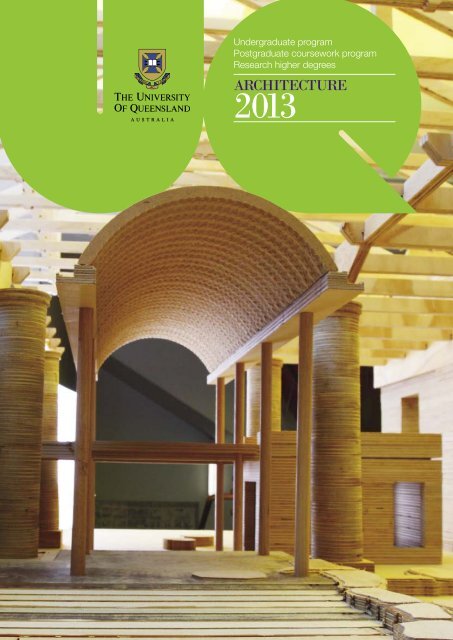
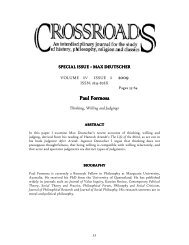
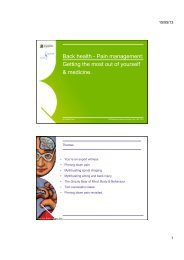
![Recycling [ PDF, 62KB ] - University of Queensland](https://img.yumpu.com/51805185/1/184x260/recycling-pdf-62kb-university-of-queensland.jpg?quality=85)
